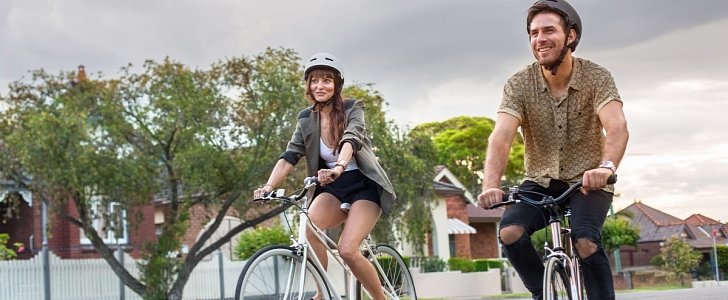According to a new, scathing report from cross-party Members of Parliament, the British government needs to think outside the box in order to achieve significant emissions reductions.
That entails taking people out of electric vehicles and putting them on bikes or on public transport, more or less. The report, published on August 22 and titled “Clean Growth: Technologies for meeting the U.K.’s emissions reduction target,” looks at the way in which the UK has been able to achieve world-leading emissions reductions for over 20 years and the measures that need implementing for the trend to continue.
Replacing current vehicles with lower-emission versions will simply not do, and is not the all-encompassing solution the government thinks it is. The report cites the United States Geological Survey’s warning of a possible future shortage of minerals needed to make electric vehicle batteries. Current estimates show that, at the rate EVs are made right now, mineral reserves that can be mined allow for a 30-year production period.
To put it differently, electric vehicles may offer a solution to some problems, but they’re not as green as they seem, at least in what regards the way in which minerals needed for them are mined and processed.
“In the long-term, widespread personal vehicle ownership does not appear to be compatible with significant decarbonization,” is the conclusion of the committee. Significant decarbonization could be achieved by governmental measures that would encourage biking and walking, and use of public transport, the report says.
“Reduce the number of vehicles required, for example by promoting and improving public transport,” the committee suggests. Active measures to do that would include “reducing its cost relative to private transport and encouraging vehicle usership in place of ownership” and “encouraging and supporting increased levels of walking and cycling.”
The committee also recommends banning the sales of gasoline and diesel cars ahead of the current 2040 target (2035 or sooner), improved technology to capture and store carbon, and introducing financial incentives for more energy-efficient homes.
Replacing current vehicles with lower-emission versions will simply not do, and is not the all-encompassing solution the government thinks it is. The report cites the United States Geological Survey’s warning of a possible future shortage of minerals needed to make electric vehicle batteries. Current estimates show that, at the rate EVs are made right now, mineral reserves that can be mined allow for a 30-year production period.
To put it differently, electric vehicles may offer a solution to some problems, but they’re not as green as they seem, at least in what regards the way in which minerals needed for them are mined and processed.
“In the long-term, widespread personal vehicle ownership does not appear to be compatible with significant decarbonization,” is the conclusion of the committee. Significant decarbonization could be achieved by governmental measures that would encourage biking and walking, and use of public transport, the report says.
“Reduce the number of vehicles required, for example by promoting and improving public transport,” the committee suggests. Active measures to do that would include “reducing its cost relative to private transport and encouraging vehicle usership in place of ownership” and “encouraging and supporting increased levels of walking and cycling.”
The committee also recommends banning the sales of gasoline and diesel cars ahead of the current 2040 target (2035 or sooner), improved technology to capture and store carbon, and introducing financial incentives for more energy-efficient homes.









